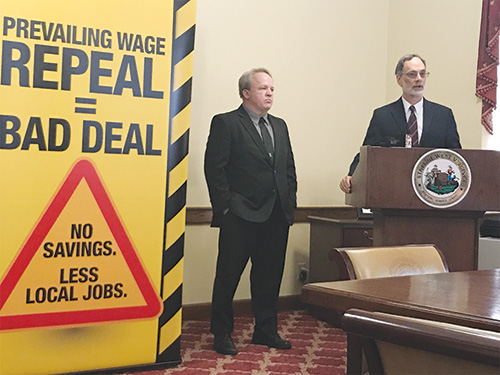
Charleston, WV – A new study from the Midwest Economic Policy Institute shows West Virginia legislators’ repeal of the state’s prevailing wage law hurt West Virginia workers but didn’t save taxpayers any money.
Missouri has thus far avoided a full repeal of prevailing wage by the Republican controlled Missouri Legislature, but lawmakers were successful last year in approving a narrowing of the law so that it will only apply to projects costing more than $75,000, a change that, when it takes effect, is likely to hurt small contractors and workers.
The West Virginia study, conducted by researchers at the University of Missouri-Kansas City and the Midwest Economic Policy Institute and released by the West Virginia State Building and Construction Trades Council, evaluated post-repeal economic and school construction project data, allowing claims made by legislative leaders during debate leading up to the repeal to be accurately tested.
“Despite legislative leaders promising a savings to taxpayers, saying the State could “build five new schools for the price of three,” the repeal has failed to provide any cost savings on school construction projects for taxpayers,” said Affiliated Construction Trades Director Steve White. “Instead, the prevailing wage repeal has negatively affected construction workers, contractors, and communities throughout the state.”
CREATING A LEVEL PLAYING FIELD
Prevailing wage laws are designed to create a level playing field for construction contractors by ensuring that public expenditures reflect local market standards for compensation and craftsmanship. Opponents, including billionaires, corporate interests and mostly Republican lawmakers, falsely claim that repealing prevailing wage results in cost savings by driving down wages. In West Virginia, many lawmakers were persuaded by a claim that the state could “build five new schools for the price of three” if the prevailing wage law was repealed.
Now three years after the repeal, economic data reveals that repeal of prevailing wage has had negative impacts for West Virginia’s construction workers, contractors, and communities while failing to deliver any meaningful cost savings:
- Inflation-adjusted hourly wages have fallen for carpenters, electricians, and operating engineers in West Virginia. Average wage growth for West Virginia’s construction trades has been between one percent and eight percent slower than in neighboring states with prevailing wage laws.
- The number of active registered apprentices has fallen by 28 percent in West Virginia, relative to neighboring states with prevailing wage laws.
- The on-the-job construction worker injury rate increased by 26 percent in West Virginia.
- An analysis of 107 winning prime contract bids finds that repeal has had no statistical impact on inflation-adjusted school construction costs.
- West Virginia has seen cost overruns and more out-of-state firms may be getting subcontracted work.
A RACE TO THE BOTTOM
The findings corroborate the conclusion of the School Building Authority of West Virginia that the state “is not realizing an overall savings that would allow for the construction of ‘five new schools for the price of three’ as some have previously claimed.” Instead, repeal of West Virginia’s prevailing wage law has resulted in a race to the bottom.
Prevailing wage laws have been a focus of public policy debates across the country for several years. Regardless of an emerging academic consensus showing that prevailing wage laws lead to enhanced productivity, higher wages for construction workers, and better safety outcomes while having little to no discernible impact on total construction costs, lawmakers continue to be focused on repealing the laws.
White says it’s no surprise that the West Virginia repeal produced nothing more than a race to the bottom.
“Construction worker wages have in some cases fallen, and in most cases, not kept pace with the rising cost-of-living, apprenticeship training has fallen significantly, and on-the-job injury rates have worsened,” White said. “More out-of-state firms have entered the market and won bids on public projects, but the repeal has failed to provide any cost savings for taxpayers.”
The rollback of Missouri’s prevailing wage law will take effect on July 1.


